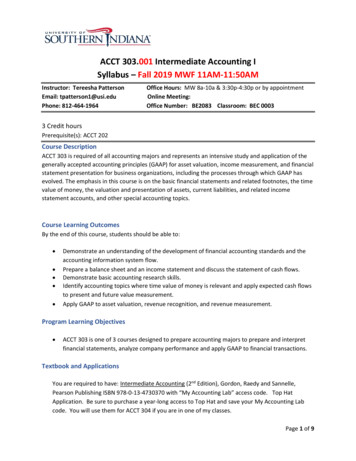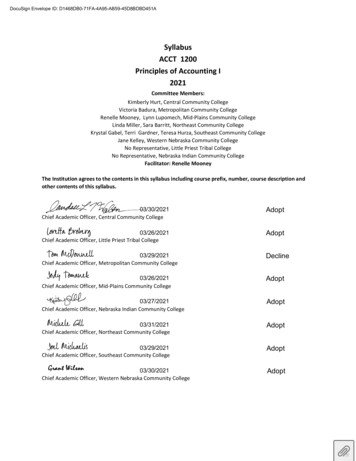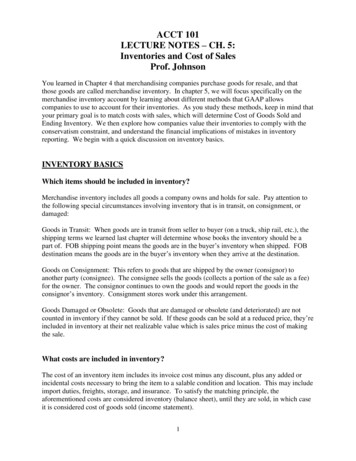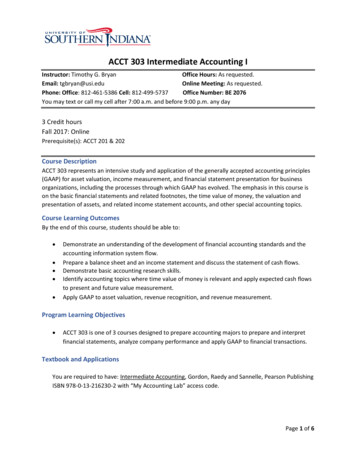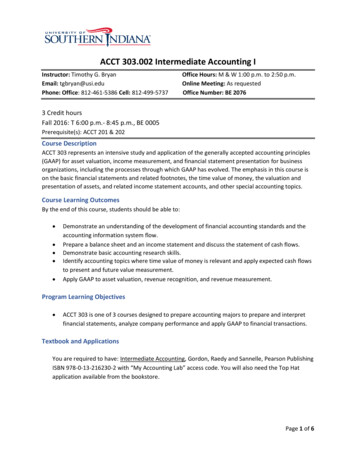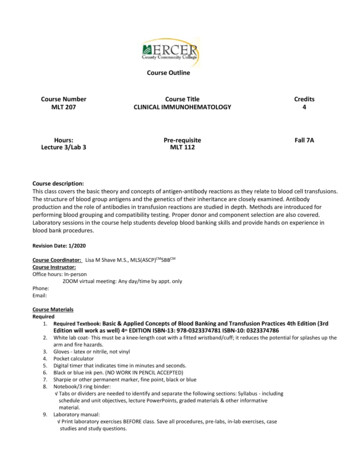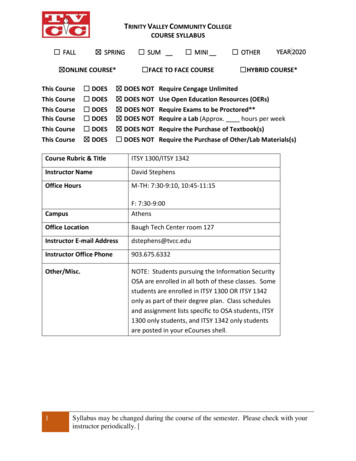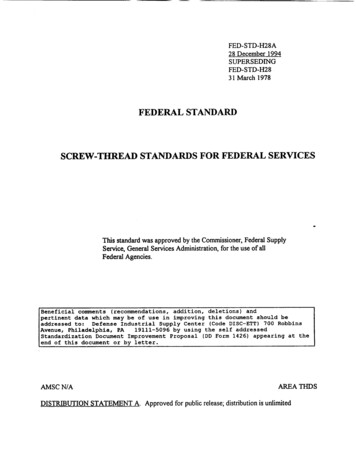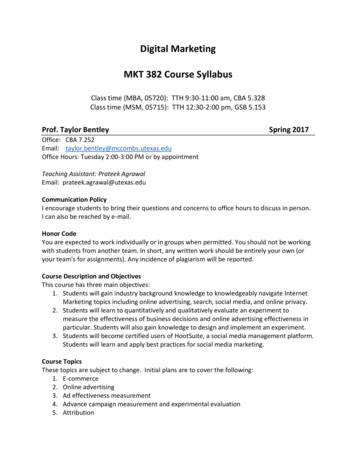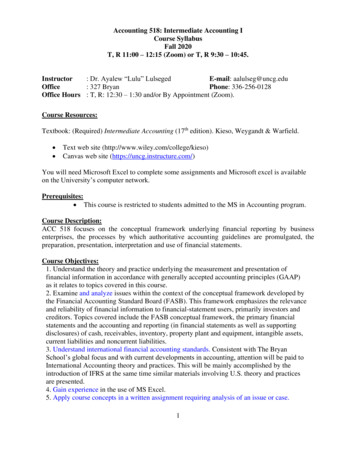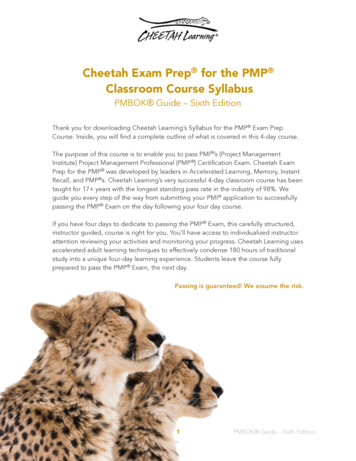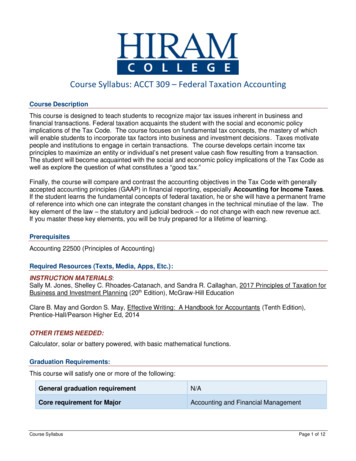
Transcription
Course Syllabus: ACCT 309 – Federal Taxation AccountingCourse DescriptionThis course is designed to teach students to recognize major tax issues inherent in business andfinancial transactions. Federal taxation acquaints the student with the social and economic policyimplications of the Tax Code. The course focuses on fundamental tax concepts, the mastery of whichwill enable students to incorporate tax factors into business and investment decisions. Taxes motivatepeople and institutions to engage in certain transactions. The course develops certain income taxprinciples to maximize an entity or individual’s net present value cash flow resulting from a transaction.The student will become acquainted with the social and economic policy implications of the Tax Code aswell as explore the question of what constitutes a “good tax.”Finally, the course will compare and contrast the accounting objectives in the Tax Code with generallyaccepted accounting principles (GAAP) in financial reporting, especially Accounting for Income Taxes.If the student learns the fundamental concepts of federal taxation, he or she will have a permanent frameof reference into which one can integrate the constant changes in the technical minutiae of the law. Thekey element of the law – the statutory and judicial bedrock – do not change with each new revenue act.If you master these key elements, you will be truly prepared for a lifetime of learning.PrerequisitesAccounting 22500 (Principles of Accounting)Required Resources (Texts, Media, Apps, Etc.):INSTRUCTION MATERIALS:Sally M. Jones, Shelley C. Rhoades-Catanach, and Sandra R. Callaghan, 2017 Principles of Taxation forBusiness and Investment Planning (20th Edition), McGraw-Hill EducationClare B. May and Gordon S. May, Effective Writing: A Handbook for Accountants (Tenth Edition),Prentice-Hall/Pearson Higher Ed, 2014OTHER ITEMS NEEDED:Calculator, solar or battery powered, with basic mathematical functions.Graduation Requirements:This course will satisfy one or more of the following:General graduation requirementN/ACore requirement for MajorAccounting and Financial ManagementCourse SyllabusPage 1 of 12
Correlative, track or additional coursework forMajorBusiness ManagementCore Curriculum RequirementESCourse Learning OutcomesCOURSE OVERVIEWFederal Taxation has the following major themes: Tax Policy: Federal Taxation acquaints the student with the social and economic policyimplications of the Tax Code. Additionally, federal taxation explores the question of whatconstitutes a good tax. Taxes and Decision Making: Federal Taxation illustrates the role of taxes in financial decisionmaking and how taxes motivates people and institutions to engage in certain transactions. Tax Planning: Federal Taxation develops certain income tax planning principles to maximize anentity or individual’s net present value cash flow resulting from a transaction. Tax Law and Generally Accepted Accounting Principles: Federal Taxation will compare andcontrast the accounting objectives in the Tax Code with generally accepted accounting principles(GAAP) in financial reporting.COURSE GOALS Analysis: You will review financial transactions to determine tax impact. You will prepare taxprovisions to determine the tax treatment of financial transactions. You will analyze tax proposalsto assess their impact on economic and social goals. Technical Proficiency: You will prepare corporate tax provisions incorporating tax lawprovisions as well as prepare individual tax returns. Communication: You will prepare written analysis of tax situations and issues and will discussissues. Research: You will research in IRS Publications resolution of specific tax issues. You willanalyze case studies to identify tax issues. Financial Models: You will prepare tax provisions utilizing Excel spreadsheet templates. Professional Responsibilities: You will analyze case studies and answer discussion questionson professional responsibilities related to tax practice.FOUNDATION FOR UNDERSTANDING THIS COURSE Principle One: You should learn the tax law as an integrated component of a complex economicenvironment. You should be aware of the role taxes play in financial decision making and shouldunderstand how taxes motivate people and institutions to engage in certain transactions.Course SyllabusPage 2 of 12
Principle Two: You should comprehend the tax law as an organic whole rather than as afragmented collection of rules and regulations. You should learn general tax rules rather than themyriad of exceptions that confuse rather than clarify the general rules. You should appreciatehow the general rules apply to all taxpaying entities before you learn how specialized rules applyto only certain entities. Finally, you should learn how the law applies to broad categories oftransactions rather than to a particular transaction. Principle Three: If you learn the fundamental concerts of taxation, you will have a permanentframe of reference into which you can integrate the constant changes in the technical minutiae ofthe law. The rapid evolution of the tax law results in a short shelf life for much of the detailedinformation contained in undergraduate tax texts. Yet the key elements of the law – the statutoryand judicial bedrock – do not change with each revenue act. If you master these key elements,you are truly prepared for a lifetime of learning.Assessment and EvaluationGrading Scale93 - 100A90 - 92A-87 - 89B 84 - 86B80 - 83B-77 - 79C 74 - 76C70 - 73C-67 - 69D 64 - 66D60-63D-Below 60FGrading of AssessmentsAssessmentPreparation of Individualand Corporate Income TaxReturnsDiscussion ForumReflective MemorandumsQuizzesHomeworkOther AssignmentsTOTALCourse SyllabusTotal Points600Percent of 0100%Page 3 of 12
Grades are based on an accumulation of points. There are 2,200 points available. Extra credit is notavailable. Grades will be calculated on the basis of points earned, divided by total points, then translated into apercentage. For example, 1,691 points were earned. Dividing this total by the possible total of 2,200yields a percentage of 76.86, or a C .No "rounding up" of grades will be done, except to the final course grade and, only if applicable.Grading exams on a curve is rare and will only be at the discretion of the instructor.All assignments are due on the due date. The ONLY exception will be a college-sanctioned excusesuch as illness, death, etc. Proof is required in all cases.A grade of Incomplete will be given only in extreme situations and only at the discretion of theinstructor.o At my option, after consultation with my department head, I may choose to issue you, thestudent, an “I” (for Incomplete Grade) at the end of the course. You will be issued an“Incomplete Grading Contract” which is an agreement between: (1) you, (2) I and (3) theHiram College Registrar. The contract will indicate: (a) the percentage of work completed inthe class thus far, (b) the work still needed to be completed and (3) THE DATE THE WORLKMUST BE FINISHED, COMPLETED AND HANDED IN TO ME. You will be consultedregarding a mutually agreeable future deadline date.o There will be NO reminders given regarding the completion date. If the work is not in myhands by that date, you will automatically be given an “F” (Failing) grade for this course.Please give yourself plenty of time to complete the work and remind yourself of thecompletion date in some form or fashion.Accountants are PROFESSIONALS, thus accuracy and neatness in all work performed during thiscourse is expected.A “Scorecard” worksheet for determining what work is to be done each week and the point total foreach assignment has been downloaded to Moodle for your use. Individual grades will be shown onyour individual assignments as well. A “Homework Grading Key” has also been provided in Moodleto enable you to determine the relative weights of each homework assignment problems.A “Schedule of Session Topics and Class Assignments” showing all assignments and due dates hasalso been downloaded to Moodle for your use.PENALTIES FOR LATE SUBMISSION OF ASSIGNMENTS:Assignments are due at the time indicated. The last possible time for an assignment to be considered“timely” is the close of the class week (11:59 PM on Sunday) on the day indicated that an assignment isdue. The penalty for late submission of an assignment is as follows: 10% penalty (reduction in that assignment’s grade) if submitted within 24 hours of the deadline(and “late” begins 1 minute after the deadline)20% penalty if submitted within 48 hours of the deadline30% penalty if submitted within 72 hours of the deadline NO ASSIGNMENTS WILL BE ACCEPTED MORE THAN 72 HOURS AFTER THE DEADLINECourse SyllabusPage 4 of 12
WEEKLY SESSION TOPICS AND ASSIGNMENTS: All written assignments should be submitted in a file format that is compatible with Microsoft Officeapplications, either Microsoft Word or Microsoft Excel (i.e. a written document must be accessibleusing Microsoft Word 2003 or later (acceptable file formats include: .doc, .docs, .rtf)). Homeworko The homework has been assigned in advance on your “Schedule of Session Topics andClass Assignments.”o The idea of homework is to reinforce the concepts introduced during the review of thechapter. We may not have discussed the concept in class prior to you working on thehomework assignment. Rest assured the taxation principles will be thoroughly covered ina subsequent class! The plagiarism policy for this course will be that as depicted in the Hiram College StudentHandbook college-handbook-20132014.pdf) with the further understanding that copying any material from any source and cut-andpasting from the Internet will be grounds for a failing assignment grade. Copying material andchanging a few of the words in an attempt to claim originality will be considered plagiarism. Yourassignments MUST BE in your own words. Proper credit must be given for referenced andquoted material. Quotations exceeding 20% of the assignment will be considered excessive.READING ASSIGNMENTS:There are assigned readings each week, some from the textbook and some from outside sources. Dueto copyright restrictions of publishers, etc. several articles assigned to this course were no longeravailable via an internet address. They have been reproduced in .pgf format. There are two articles inthat format in Weeks 1, 4 and 8. The remainder of the articles have been listed in internet format and areso linked.Week 5’s handouts on income taxes have been reproduced in .pdf format.REQUIREMENTS FOR REFLECTIVE MEMORANUMS AND DISCUSSION FORUMS:All essays listed under “Reflective Memorandums” are to be answered fully. The format is that of adouble spaced, at least a full page of writing essay. Points will be deducted from each essay that isnot a minimum of a full page in length,All essays listed under “Discussion Forums” are to be answered fully. There is no length requirementstipulated in the answer.Course ResourcesACADEMIC ACCOUNTING ACCESS:Hiram College accounting students are able to access FASB (Financial Accounting Standards Board)Accounting Standards Codification Professional View and GARS (Governmental Accounting ResearchSystem) online.Access this resource through the Accounting Community Site on Moodle using the following:Course SyllabusPage 5 of 12
Student AccessUsername: AAA53062Password: 3E4rsUPWEBSITE RESOURCES:The following is a sample of internet sites that provide general information on tax law, tax planning, taxforms, airmark.comwww.us.deloitte.comwww.bna.orgCourse PoliciesProfessors’ Expectations of the Students:Please note the following expectations that we expect from you:You are expected to have access to a computer and high-speed Internet. Dial-up connections are notsupported and should not be used. Review the Student Guide to Online urces) located on the Online Learning Resources Web pagefor information regarding recommended and supported systems, applications, and Internet browsers.Assignments1. You are expected to know from Moodle and postings what the assignments and activities are andwhen they are due.2. You are expected to do all of the requested readings and assignments by their deadline.3. All written assignments should be submitted in a file format that is compatible with Microsoft Office applications. For example, a written document must be accessible using Microsoft Word 2003 orlater (acceptable file formats include .doc, .docs, .rtf).4. The penalty for late submission of assignments: I will tolerate late papers without penalty only in EXTREME circumstances. You mustnotify someone in the university administration or faculty that you will miss apaper deadline PRIOR to the due date and documentation will be required forverification of your absence. The Individual and Corporate income tax returns assigned are due on the last class day(including scheduled final exams). There are no exceptions to this rule. Since thiscollective class assignment counts for 50 percent (50% - 200/400) of your class grade,failure to comply with this deadline will result in an “F’ for the course irrespective of whatgrades may have been earned earlier in the course.5. Guidelines for Written Work: Your instructor will determine what style guide you are to use forwritten work. See the Purdue Owl (http://owl.english.purdue.edu/owl/) for guidelines on using APA orMLA format.Forums1. Course Announcements – This forum is where I will post pertinent information about the coursethat you need to know. You will receive an email alerting you when I add a new courseCourse SyllabusPage 6 of 12
announcement. No excuses will be accepted for not being aware of information posted to this forum.2. Ask the Class! – This forum is for you to post questions about the course activities or assignments.Posting your questions here benefits the entire class as other students may have the same questionand I only need to provide the answer one time.3. Discussions – You are expected to participate in discussion forums. Each student’s contribution ina forum is read and assessed by all the other students in the class and used as learning points,areas for debate, assessments of assignments, and shared experiences. In order for studentpostings to be appropriate and complete, it may be necessary for students to sign in and post overa period of several days, thus being able to read and comment on newly posted comments by otherstudentsNote 1: When Discussion Forums occur, you are expected to participate with substantive posts bythe Post due date, and to respond to your classmates’ postings as directed in each forum.Note 2: Some discussion forums may have special features that limit viewer access to studentpostings. An example of a restricted forum may be group forums where only members of agroup have viewing access.Communication1. If you need to send me or another student a private message, please use the MoodleMessages function located under the Navigation block on the left side of the course –Navigation My profile Messages.2. If you have an emergency, please call the Office of Professional and Graduate Studies at1-330-569-5161.3. Students are responsible for frequently checking their emails, Course Announcements forum, Askthe Class! forum, and updates from Moodle. Such communications may include changes, futureassignments, and curriculum adjustments, evaluations from other students, and professor’scomments and directions.4. You should log into the course frequently enough to participate in all class activities such asdiscussion forums, postings, tests, and assignments.5. The plagiarism policy for this course will be that as depicted in the Hiram College StudentHandbook (https://my.hiram.edu/ords/apexdev/f?p 550:140:::NO::P140 CAT ID:64) with thefurther understanding that copying any material from any source and cut-and-pasting from theinternet will be grounds for a failing assignment grade. Copying material and changing a few of thewords in an attempt to claim originality will be considered plagiarism. Your assignments must be inyour own words. Proper credit must be given for referenced and quoted material. Quotationsexceeding 20% of the assignment will be considered excessive.Additional Course Expectations If your computer is not downloaded with the Excel 2007 (or newer) program or the Word 2003 (ornewer) program, please make arrangements to find computers with these programs on thoseparticular computers. This will allow the program that you e-mail to the instructor to becompatible with his software. Peter Drucker, the famous management consultant, said: “Know thy time!” It will be up to eachof you to manage your time properly as to get the most possible out of this class. However, sinceit is your time, I am not going to micromanage your lives. Be aware of what is being demanded ofyou in this class and when it is due so that you can budget your time accordingly. If there is a topic or area that you do not understand, please ask about it! Taxation is often aforeign language of its own and is not easily mastered. I have developed a lot of ways to explaintaxation principles – so if one way doesn’t work, we will try another. Mole’s maxim: “There is NOSUCH THING as a dumb question.”Course SyllabusPage 7 of 12
Along the same lines, consult your e-mail page daily as well. I have been known to send out“broadcast e-mails” to all students before class regarding last-minute announcements, readingsand bulletins. Taxes are one of the most significant influences in an individual’s life. An individual whounderstands how taxes relate to their life can take an active role in planning and evaluating theimpact of tax law changes and proposals. This understanding will enable you to design taxplanning strategies to minimize the amount of taxes you pay. You will be able to take advantageof tax savings opportunities. You will be able to analyze tax reform proposals to determine theirmerits, efficiency and fairness and you will be able to change the tax system (hopefully!) byparticipating as a knowledgeable voter. At the end of this course, you will be able to identify and understand the standards of a good taxand you will be able to compare, evaluate, analyze and critique new reform proposals. You will be able to identify and properly classify differences between financial and tax accountingand prepare a tax provision and related financial footnote disclosure. You will be able to prepare an individual and corporate tax return.Students’ Expectations of the Professor(s):Please note the following expectations that you can expect from your professors:1. I will try to log onto Moodle at least once per day for the purpose of monitoring the course andcommunicating with students. I will review Moodle Messages, the Ask the Class! forum and anycurrent discussions.2. I will grade all assignments and tests returning said assessments within seven days after theirreceipt.3. I will try to return comments or emails from students within twenty-four hours of receipt.NetiquetteNetiquette is the use of proper manners on the Internet. Read the following guidelines on Netiquette. Youare expected to follow the netiquette policy and adhere to the netiquette guidelines presented under thissection. Inappropriate online behavior will not be tolerated. DON'T SHOUT! Typing in all caps indicates shouting and might be offensive to others.Check your writing for grammar and spelling errors. Your writing style reflects upon youpersonally. In an online course, it is important to write clearly, avoid grammatical and spellingerrors, and review your work using spell check before posting your thoughts online.Respect others privacy and opinions. Ask questions if you need clarification or if you don'tunderstand what someone is trying
Course Syllabus Page 3 of 12 Principle Two: You should comprehend the tax law as an organic whole rather than as a fragmented collection of rules and regulations. You should learn general tax rules rather than the myriad of excep
